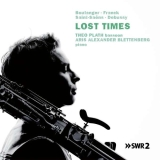Theo Plath sagt über seine neue CD: « Die Musik des Impressionismus und der späten Romantik war für mich als Fagottist schon immer ein Objekt der Sehnsucht. (…) Mit dieser CD erfülle ich mir den persönlichen Traum, in den für das Fagott als Soloinstrument verlorenen Zeiten der Romantik und des Impressionismus zu schwelgen ». Schwelgen ist sicherlich ein zutreffendes Wort, dem ich noch ein anderes hinzufügen will: singen.
Theo Plath, Preisträger des Internationalen ARD-Musikwettbewerb 2019 und Solofagottist des hr-Sinfonieorchesters Frankfurt, kann zwar sein Fagott auch virtuos spielen, aber es sind vor allem die lyrischen Qualitäten seines Spiels, die faszinieren. Und, nicht zu unterschätzen, sein interpretatorisches Können, die Art und Weise, wie er sich die hier vereinten französischen Kompositionen aneignet, wie sicher er auch auf dem Fagott den Charakter der bearbeiteten Sonaten trifft. Es geht ihm gewiss nicht darum, auf Show zu machen, sein Können ins Rampenlicht zu stellen, sondern es geht um die Musik. Er und der ebenfalls hervorragend mitgestaltende Aris Alexander Blettenberg am Klavier entführen den Hörer wie mit purer Magie in eine Debussy-Welt voller transzendierender Klänge. Nicht weniger berückend ist die Franck-Sonate, in dem sie die Leidenschaftlichkeit der Rhetorik ebenso gut wiedergeben wie die verhalten-traurig klagende Musik, die es in diesem Werk gibt.
Das Fagott spielt oft die klischeehafte Rolle des gemütvollen, wenn nicht gar humoristischen Instruments. Dieses Klischee hat Theo Plath definitiv überwunden, er gibt dem Instrument eine neue Rolle, mit einer erweiterten Rhetorik und einer Musikalität, die weit über das hinausgeht, was man sonst mit Fagott verbindet. Man spürt in jedem Takt, dass hier mit Liebe und Verständnis musiziert wird und vor allem, dass die Musiker überzeugt sind von dem, was sie machen.
In Camille Saint-Saëns’ Fagott-Sonate, dem einzigen Werk der CD, das im Original für das Instrument geschrieben wurde, überzeugt Plath ebenfalls durch eine souveräne Beherrschung der lyrischen Teile der Komposition und veredelt das Allegro Scherzando mit einem feinen, soften Staccato, wie ich es in dieser Sonate noch nicht gehört habe.
Blettensbergs einfühlsame und unterstützende Präsenz am Klavier unterstützt den klaren, fokussierten Ton des Fagotts in einer absolut perfekten Mischung.
Theo Plath says about his new CD: » I always found that the music of Impressionism and Late Romanticism was an object of longing for me as a bassoonist. (…) With this CD I have fulfilled my personal dream to revel in the music of Romanticism and Impressionism, an era otherwise mostly lost for the bassoon as a solo instrument. »
Reveling is certainly an appropriate word, to which I will add another: singing. Theo Plath, winner of the International ARD Music Competition 2019 and solo bassoonist of the Frankfurt Radio Symphony Orchestra, can of course play his bassoon virtuously, but it is above all the lyrical qualities of his playing that fascinate. And, not to be underestimated, his interpretative skills, the way he appropriates the French compositions united here, how confidently he captures the character of the arranged sonatas on the bassoon as well. He is certainly not concerned with putting on a show, with putting his skills in the limelight, but only interested in the music. He and pianist Aris Alexander Blettenberg, who is also an outstanding partner, carry the listener away as if by pure magic into a Debussy world full of transcending sounds. No less enchanting is the Franck Sonata, in which they render the passionate rhetoric just as well as the restrained, sadly plaintive music that exists in this work.
The bassoon plays often the clichéd role of the jovial, if not humorous, instrument. Theo Plath has definitely overcome this cliché, giving the instrument a new role, with an expanded rhetoric and a musicality that goes far beyond what one usually associates with the bassoon. One senses in every measure that music is being made here with love and understanding and, above all, that the musicians are convinced of what they are doing.
In Camille Saint-Saëns’ Bassoon Sonata, the only work on the CD originally written for the instrument, Plath is also convincing with a commanding mastery of the lyrical parts of the composition and he enhances the Allegro Scherzando with a fine and soft staccato the likes of which I have not heard before in this sonata.
Blettensberg’s sensitive and supportive presence on the piano backs the bassoon’s clear, focused tone in an absolutely perfect blend.
























